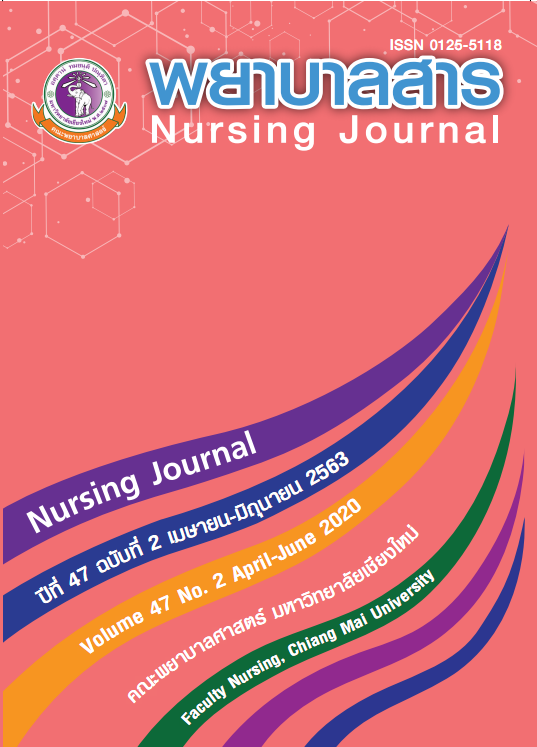ปัจจัยทำนายพฤติกรรมการเป็นสมาชิกที่ดีขององค์การในพยาบาลรุ่นเจเนอเรชั่นวาย โรงพยาบาลมหาวิทยาลัยของรัฐ
คำสำคัญ:
ปัจจัยทำนาย, พฤติกรรมการเป็นสมาชิกที่ดีขององค์การ, พยาบาล, เจเนอเรชั่นวาย, โรงพยาบาลมหาวิทยาลัยของรัฐบทคัดย่อ
พฤติกรรมการเป็นสมาชิกที่ดีขององค์การมีความสำคัญต่อประสิทธิผลและความสำเร็จขององค์กรพยาบาล การวิจัยครั้งนี้มีวัตถุประสงค์เพื่อศึกษาการรับรู้การสนับสนุนขององค์การ ความไว้วางใจในหัวหน้าหอผู้ป่วย พฤติกรรมการเป็นสมาชิกที่ดีขององค์การ และปัจจัยทำนายพฤติกรรมการเป็นสมาชิกที่ดีขององค์การในพยาบาลรุ่นเจเนอเรชั่นวาย โรงพยาบาลมหาวิทยาลัยของรัฐ กลุ่มตัวอย่างเป็นพยาบาลรุ่นเจเนอเรชั่นวาย โรงพยาบาลมหาวิทยาลัยของรัฐในเขตภาคเหนือ จำนวน 306 คน เครื่องมือที่ใช้ในการวิจัยประกอบด้วย 1) แบบสอบถามข้อมูลส่วนบุคคล 2) แบบสอบถามการสนับสนุนขององค์กรตามการรับรู้ของพยาบาลของ Sanghon, Thungjaroenkul & Nantsupawat (2017) 3) แบบสอบถามความไว้วางใจในหัวหน้าหอผู้ป่วยของ Sirawongtham (2002) และ 4) แบบสอบถามพฤติกรรมการเป็นสมาชิกที่ดีขององค์การของ Podsakoff et al. (1990) ซึ่งแปลเป็นภาษาไทยโดยคณะผู้วิจัย แบบสอบถามส่วนที่ 2 ถึง 4 ได้รับการตรวจสอบความเที่ยงโดยหาค่าสัมประสิทธิ์แอลฟาครอนบาค เท่ากับ .87, .96 และ .85 ตามลำดับ วิเคราะห์ข้อมูลโดยใช้สถิติถดถอยพหุคูณแบบเป็นขั้นตอน
ผลการวิจัยพบว่า การรับรู้การสนับสนุนขององค์การอยู่ในระดับปานกลาง ความไว้วางใจในหัวหน้าหอผู้ป่วย และพฤติกรรมการเป็นสมาชิกที่ดีขององค์การอยู่ในระดับสูง ปัจจัยที่สามารถทำนายพฤติกรรมการเป็นสมาชิกที่ดีขององค์การอย่างมีนัยสำคัญทางสถิติที่ .05 คือ ความไว้วางใจในหัวหน้าหอผู้ป่วยด้านความเปิดเผย และการรับรู้การสนับสนุนขององค์การ โดยสามารถร่วมกันทำนายได้ร้อยละ 14.20 (R2=.142) ผลการศึกษาครั้งนี้เป็นข้อมูลพื้นฐานให้ผู้บริหารทางการพยาบาลตระหนักถึงความสำคัญของการสนับสนุนขององค์การ ความไว้วางใจในหัวหน้าหอผู้ป่วย และใช้เป็นแนวทางส่งเสริมพฤติกรรมการเป็นสมาชิกที่ดีขององค์การในพยาบาลรุ่นเจเนอเรชั่นวาย โรงพยาบาลมหาวิทยาลัยของรัฐต่อไป
เอกสารอ้างอิง
Clark, K. R. (2017). Managing Multiple Generations in the Workplace. Radiologic technology, 88 (4), 379-396.
Eisenberger, R., Huntington, R., Hutchison, S., & Sowa, D. (1986). Perceived organizational support. Journal of Applied Psychology, 71, 500–507.
Fatma, A., & Elewa, H. A. (2016). The Relationship between Org anizational Support, Work Engagement and Organizational Citizenship Behavior as Perceived by Staff Nurses at Different Hospitals. Journal of Nursing and Health Science, 5 (4), 112-123.
Halfer D., & Graf, E. (2006). Graduate nurse perceptions of the work experience. Nurs Econ, 24(3), 150-155.
Iamsa-ard, P. (2009). Relationships between Trust in Head Nurses, Organizational Citizenships Behavior and Organizational Commitment of Nursing Employee, Gov ernment University Hospitals (Master’s thesis, Chulalongkorn University). (In Thai)
Intaratate, N. (2013). Organizational Citizenship Behavior of Professional Nurses in o ne TertiaryHospital (Master’s thesis Mahidol University). (In Thai)
Jeenkool, P. (2004). Relationships between Personal Factors, Achievement Motivation , Organizational Support, and Career Success of Professional Nurs es, Government University Hospitals (Master’s thesis, Chulalongkorn University). (In Thai)
Khunthar, A. (2014). The impacts and Solutions to Nursing Workforce Shortage in Thailand.Journal of Nursing Science, 32(1), 81-90. (In Thai)
Laipanittawon, P. (2007). Relationships among perceived organizational justice, locus of control and organizational citizenships behavior of professional nurses in Community Hospitals in Lampang Province (Master’s thesis, Chiangmai University). (In Thai)
Lavoie-Tremblay, M., Leclerc, E., Marchionni, C., & Drevniok, U. (2010). The needs and expectations of generation Y nurses in the workplace. Journal for Nurses in Professional Development, 26(1), 2-8.
Moorman, R. H., & Blakely, G. L. (1995). Individualism-collectivism as an individual difference predictor of organizational citizenship behavior. Journal of Organizational Behavior, 16 (2), 127–142.
Nelsey, L., & Brownie, S. (2012). Effective leadership, teamwork and mentoring-essential elements in promoting generational cohesion in the nursing work force and retaining nurses, Collegian (Royal College of Nursing, Australia), 19 (4), 197-202.
Nesa, M., Kunawikitkul, W., & Wichaikhum, O. (2018). Participation in Decision Making andOrganizational Citizenship Behavior among Nurses in Medical Col lege Hospitals, Dhaka, The People’s Republic of Bangladesh. Nursing Journal, 45 (4), 192-202.
Organ, D., & Podsakoff, P. M. (2006). Organizational citizenship behavior: Its nature, antecedents, and consequences. United States of America: Sage Publication, Inc.
Podsakoff, P. M., MacKenzie, S. B., Moorman, R. H., & Fetter, R. (1990). Transformational leader behaviors and their effects on followers’ trust in leader, satisfaction, and organizational citizenship behaviors. The leadership quarterly, 1(2), 107-142.
Podsakoff, P. M., MacKenzie, S. B., Paine, J. B., & Bachrach, D. G. (2000). Organizational citizenship behaviors: A critical review of the theoretical and empirical literature and suggestions for future research. Journal of Management, 26 (3), 513-563.
Rhoades, L., & Eisenberger, R. (2002). Perceived organizational support: a review of the literature.Journal of Applied Psychology, 87 (4), 698-714.
Robbins, S. P. (2001). Organizational Behavior. New Jersey: Prentice-Hall, Inc.
Shacklock, K., & Brunetto, Y. (2012). The intention to continue nursing: work variables affecting three nurse generations in Australia. Journal of Advanced Nursing, 68 (1), 36-46.
Sherman, R. O., Saifman, H., Schwartz, R. C., & Schwartz, C. L. (2015). Factors that lead Generation Y nurses to consider or reject nurse leader roles. Nursing Plus Open, 1, 5-10.
Sanghon, K., Thungjaroenkul, P., & Nantsuupawat, A. (2017). Perceived organizational support and proactive work behavior among registered nurses. Nursing Journal, 44 (4), 134-144. (In Thai)
Sirawongtham, S. (2002). Relationships between Trust in Head Nurses, Organizational Commitment, Organizational Support and Organizational Citizenships Behavior of Staff Nurses, General Hospitals (Master’s thesis, Chulalongkorn University). (In Thai)
Srisatidnarakul, B. (2007). The methodology in Nursing Research. Bangkok: UandI intermedia company. (In Thai)
Techanant, P. (2013). A study of relationship between workplace motivation and Organizational Citizenships Behavior of University support staff: A case study of medicine in Bangkok (Master’s thesis, Silpakorn University). (In Thai)
Yongprawat, T., Noimunwai, P., & Prapaipanit, W. (2016). The Relationships between Generations,Magnetic Work Environment, and Working Happiness as perceived by Professional Nurses. Journal of The Royal Thai Army Nurses, 17 (1), 148-155. (In Thai)
ดาวน์โหลด
เผยแพร่แล้ว
รูปแบบการอ้างอิง
ฉบับ
ประเภทบทความ
สัญญาอนุญาต
บทความที่ได้รับการตีพิมพ์เป็นลิขสิทธิ์ของวารสารพยาบาลสาร
ข้อความที่ปรากฏในบทความแต่ละเรื่องในวารสารวิชาการเล่มนี้เป็นความคิดเห็นส่วนตัวของผู้เขียนแต่ละท่านไม่เกี่ยวข้องกับมหาวิทยาลัยเชียงใหม่ และคณาจารย์ท่านอื่นๆในมหาวิทยาลัยฯ แต่อย่างใด ความรับผิดชอบองค์ประกอบทั้งหมดของบทความแต่ละเรื่องเป็นของผู้เขียนแต่ละท่าน หากมีความผิดพลาดใด ๆ ผู้เขียนแต่ละท่านจะรับผิดชอบบทความของตนเองแต่ผู้เดียว






